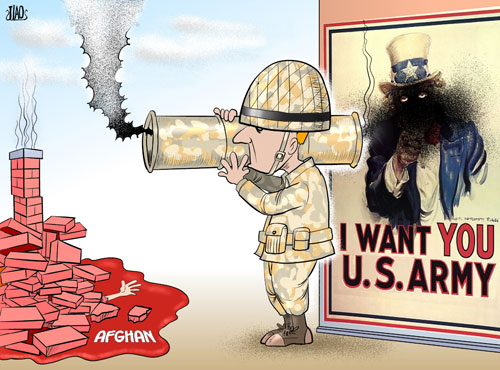Will Afghanistan become a U.S. campaign issue?
- By Matthew Rusling
 0 Comment(s)
0 Comment(s) Print
Print E-mail Xinhua, April 5, 2012
E-mail Xinhua, April 5, 2012
As Republican presidential candidates gear up for Tuesday's primaries, they remain mute on the U.S. war in Afghanistan despite recent blunders including the slaying of 16 Afghan civilians by a rogue U.S. soldier.
|
|
|
Backfire [By Jiao Haiyang/China.org.cn] |
But given those events, as well as other recent U.S. missteps including the burning of Korans, U.S. President Barack Obama's handling of the war could amount to a savory chunk of political beef to bite down on for whoever runs on the Republican Party's ticket in November elections.
"Republicans will complain that our foreign policy lacks vision and focus," Darrell M. West, vice president and director of governance studies at the Brookings Institution, told Xinhua.
Many pundits and political prognosticators have blasted Obama's handling of the war. They charge that the president's strategy for winning is ill-defined; that the counterinsurgency program is doomed to failure; and that the administration of Afghan President Hamid Karzai, upon which the U.S. relies as a strategic partner, will fail to become a national government the United States is hoping for.
A key part of the U.S. strategy also rests on Afghan forces' ability to provide security for the embattled country, but that remains in question.
"Republicans might argue that the president wanted it both ways in calling for the Afghanistan surge, but also calling for a withdrawal," John Fortier, director of the democracy project at the Bipartisan Policy Center, told Xinhua, referring to the deployment of an additional 30,000 U.S. troops to the war-ravaged country in December 2009.
"They might argue that he is moving out too soon. They might argue that he is not managing the conflict on the ground successfully," Fortier said.
Still, eyeing the issue too closely could backfire for Republican candidates if they steer too far away from the issue du jour -- a U.S. economy that is still clawing its way toward recovery from the worst recession in decades.
While the economy has shown improvement in recent months, there are still millions of unemployed and the jobless rate remains at 8.3 percent, making the recovery one of the slowest in recent memory.
"Republicans have to be careful not to go off message on the economy," said West, pointing out that high unemployment is Republicans' strongest issue.
Republican candidates have here and there taken short-lived detours during the course of the primaries, debating issues from birth control to former House speaker Newt Gingrich's comment about putting a U.S. colony on the moon.
Going off message to talk foreign policy could backfire for Republicans, as it would allow Obama to remind Americans that he was the one who got al-Qaida mastermind Osama bin Laden, said West, pointing to the U.S. raid last May on the terror kingpin's Pakistan compound that ended with his death in a firefight.
Recent polls also indicate that Americans are tired of the war. A CBS News/New York Times poll released in late March found American support for the war is at an all-time low, with 69 percent of Americans saying the U.S. should not be involved -- the highest figure since the poll began asking that question in 2009.
But while some analysts predict a degree of attention to Afghanistan, others said the issue is likely to remain muted compared with the U.S. economic issues, which are more pressing for Americans.
"Even with important developments around the world, the American domestic economy, its performance, the debt and deficit, are much more likely to be the chief issues of the campaign," Fortier said.h Moreover, Republicans have been somewhat supportive of President Obama on foreign affairs and Afghanistan. Republicans in Congress were the president's supporters on the surge when Democrats were more circumspect, he noted.
"The president's job approval numbers on economics are very low, but they are significantly higher on foreign affairs, in part because he has some Republican support," Fortier noted.
Indeed, Republican voters are not pushing to get out of Afghanistan quickly, so they may be more agreeable toward the president's Afghanistan policy than Democratic voters, he added.







Go to Forum >>0 Comment(s)